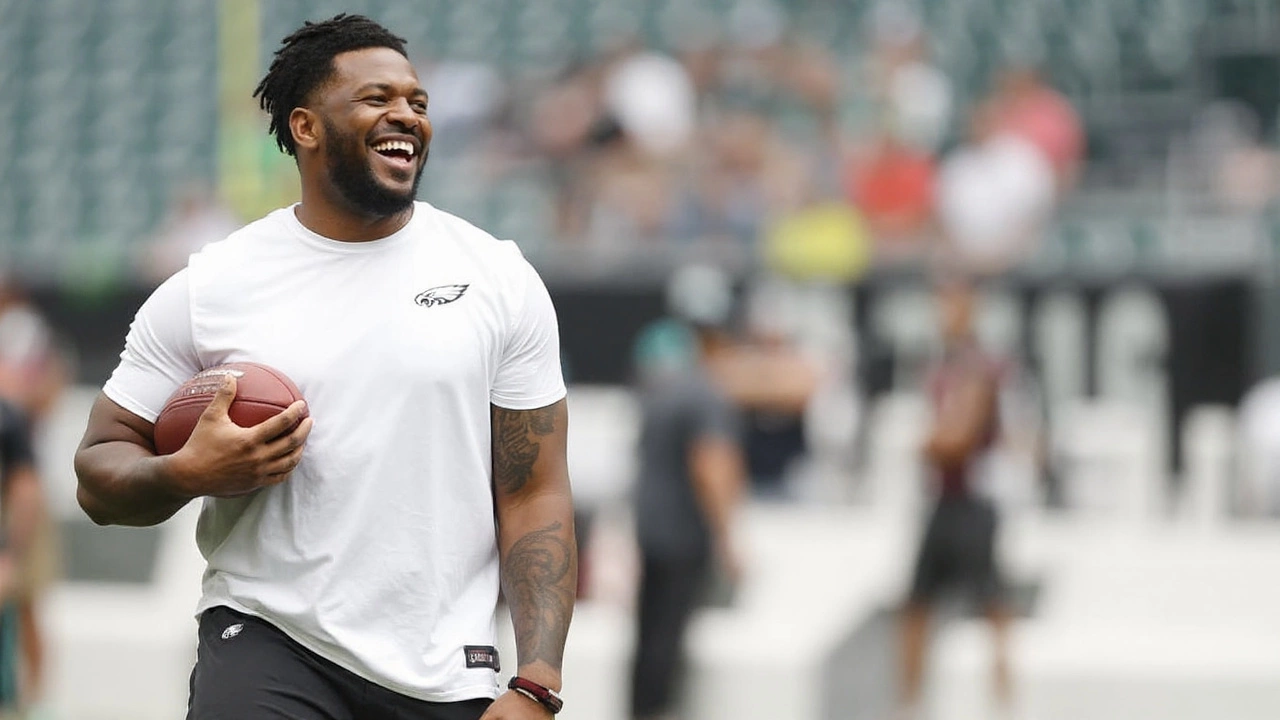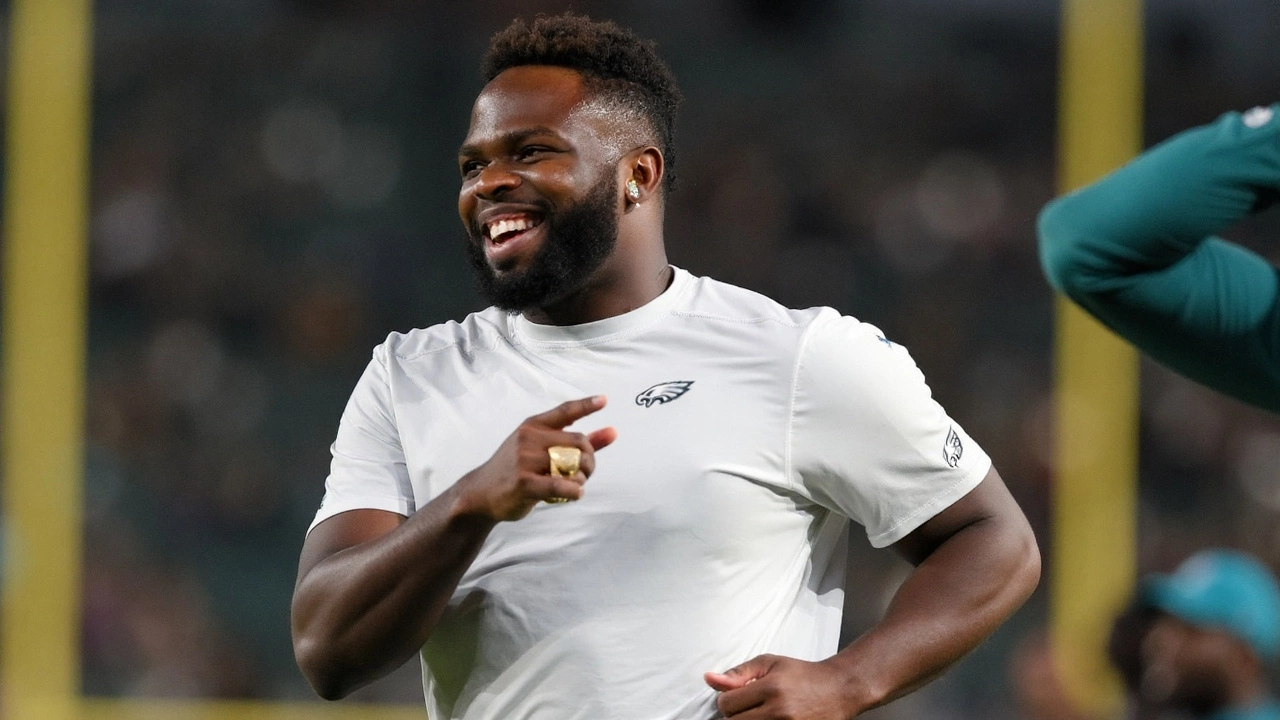Jalen Carter ejected before first snap after spitting on Dak Prescott shocks NFL opener
 Sep, 5 2025
Sep, 5 2025
An opener derailed in six seconds
Six seconds into the new NFL season, the defending champions lost their most disruptive interior lineman to a disqualifying foul that almost no one saw coming. During a dead-ball injury delay after the opening kickoff, Philadelphia Eagles defensive tackle Jalen Carter was ejected for spitting on Dallas Cowboys quarterback Dak Prescott — a non-football act that drew an immediate flag, a 15-yard penalty, and a stunned silence that quickly turned into boos across the home crowd.
The sequence was bizarre. After the kickoff, play stopped as Eagles fullback Ben VanSumeren stayed on the turf, trainers surrounding him. Near the line of scrimmage, Carter and Prescott drifted toward each other, jawing face to face. TV cameras caught Carter’s spit landing on Prescott’s jersey. An official nearby saw it live. The flag flew, the referee announced an ejection for unsportsmanlike conduct, and Carter walked off slowly, helmet at his side, as teammates tried to regroup before their first defensive snap of the year.
Later in the broadcast, a different angle aired. It showed Prescott spitting on the ground between two linemen moments earlier in the direction of the Philadelphia front — the sort of routine sideline habit players often have. That act is not a penalty. Spitting on an opponent is. The second angle didn’t change the ruling, but it did add context to how quickly the moment escalated and why both players ended up nose-to-nose during a lull in play.
Referee Shawn Smith, speaking to a pool reporter, put it plainly: an official observed the spit on an opponent, and that’s a disqualifying, non-football act. The timing made it feel even harsher. Before running a single defensive call, Philadelphia was already penalized 15 yards and down its best defensive tackle.
Dallas pounced. With a short field, the Cowboys went 6 plays for a touchdown, finishing with a 1-yard plunge by Javonte Williams. They added another Williams score later in the half, leaning on tempo and a quick-rhythm passing game to keep the Eagles’ reworked interior from finding its footing. A lengthy weather delay in the third quarter slowed everything down, but the tone had set by then: Dallas controlled the start, and the ejection was the pivot.

How it happened, what it means, and what comes next
Carter’s ejection undercut what was supposed to be a celebratory banner night in Philadelphia. The 24-year-old is the anchor of a defense that finished No. 1 last season and powered a Lombardi run. He posted 4.5 sacks and 12 tackles for loss in that campaign, wrecking protections even when he didn’t show up in the box score. All week, defensive coordinator Vic Fangio talked about the edge and tone-setter Carter brings to the front. Six seconds in, that edge was gone.
On the sideline after the incident, both players tried to step back from the fire. Teammates and staff separated them almost immediately. Carter later said the behavior wouldn’t happen again, a clear acknowledgment of the line he crossed. Prescott, for his part, said he hadn’t tried to spit on Carter, consistent with the broadcast angle that showed his spit hitting the ground earlier. Intent mattered for the discourse. It didn’t matter for the rulebook.
For anyone wondering why the call was so swift: spitting at or on an opponent is defined as a flagrant act under the league’s unsportsmanlike conduct standards. Officials don’t need a replay to toss a player if they see it. They also don’t need a prior warning. It’s in the same category as throwing a punch or making contact with an official — zero tolerance, eject on the spot.
From a football standpoint, the loss was felt right away. The Eagles’ plan with Carter typically starts with early-down disruption: compress the pocket, muddy throwing lanes, and force second-and-9 instead of second-and-5. Without him, Philadelphia had to lean more on rotation bodies inside, play more two-high safety looks to keep a lid on explosives, and accept fewer one-gap gambles that risked creases in the run game. Dallas kept the ball on schedule and stole the opening possession, all while the home defense tried to recalibrate its substitution pattern on the fly.
There was also a tone element to it. Openers always carry a little extra. Rivalry openers in prime time carry a lot extra. These teams don’t need much to set each other off, and a dead-ball stretch with cameras rolling is the worst place for a small thing to spiral. The second angle showing Prescott spitting on the ground won’t erase the ejection, but it explains how two veteran players ended up in a flashpoint before a single snap of offense or defense.
Here’s the short version of the sequence, as pieced together from the broadcast and on-field reporting:
- Kickoff to start the game; play clock at 15:00.
- Injury delay after the return as Ben VanSumeren stays down; trainers enter.
- Prescott and Carter move near the line, exchange words; Prescott spits on the ground.
- Seconds later, Carter spits on Prescott’s jersey.
- Nearby official flags the act; referee announces disqualification and 15-yard penalty.
- Dallas starts its first drive at a favorable spot and scores in six plays.
Off the field, the next chapter is the league’s discipline review. Every ejection gets a look from the NFL’s football operations department. Spitting on an opponent typically triggers a fine and can rise to a suspension depending on context and history. The league weighs what the officials saw, what the broadcast angles show, and what the players and clubs submit after the game. That process can move quickly — sometimes by Monday — but the timing often depends on how clear the video is and whether the union and team add input.
What could be on the table?
- Automatic fine for unsportsmanlike conduct tied to a disqualifying foul.
- Potential suspension if the league deems it flagrant enough, especially given it sparked a pre-snap confrontation.
- Warning and education points sent to both teams about pre-snap conduct in dead-ball windows.
The Eagles, meanwhile, have a practical problem. Their front is built around interior chaos. Take that away, and the edges don’t get as many favorable rush looks, the linebackers see more clean climbs from opposing guards, and the safeties are forced to tackle downhill more often than they’d like. In short spurts, a rotation can cover those gaps. Across four quarters against Dallas, you saw the cracks: more second-and-mediums, more manageable third downs for Prescott, and fewer blown-up runs behind the line.
Dallas deserves credit for the way it handled the sudden advantage. Offensive coordinator tilt shifted to quick hitters early: slants, speed outs, and a steady drumbeat of zone runs that tested gap integrity rather than hunting explosives. With Philadelphia forced to lean on depth inside, the Cowboys rotated backs and let the line reset the line of scrimmage. Javonte Williams’ short touchdowns weren’t flashy. They were the product of staying on schedule after the penalty flipped the field and the ejection reshaped the matchups.
Emotionally, nights like this can wobble a locker room. The Eagles spent all summer hearing about target-on-the-back energy and the thin margins of a title defense. An avoidable ejection undercuts the message the coaching staff drills daily about poise. Expect the captains — on both sides of the ball — to make this a teaching tape. There’s a reason veteran teams rehearse dead-ball situations and how to de-escalate jawing. You can’t win a title in Week 1, but you can make it harder with one impulsive moment.
Officials will also review how they managed the lull after the kickoff. Injury delays are tricky. Players mill around, adrenaline is spiking, and TV cameras hunt for reactions. Crews often move between the lines to keep space, especially if rivals are nearby. In this case, the official’s view and swift call were decisive. If anything, that quick trigger probably prevented a larger scrum.
The broadcast angle that surfaced later created a different fight — the online one. Slow-motion clips framed Prescott’s ground spit and Carter’s response like a cause-and-effect. But the rulebook doesn’t split hairs on that point. The first act wasn’t a foul. The second one was. The ejection stood, and Dallas capitalized. That’s the line fans, and the league office, will keep coming back to as the discourse spills into the week.
Beyond the headline moment, a few football details got lost:
- Philadelphia’s opening-drive defense usually features a heavy interior rotation. Carter’s absence forced an immediate reshuffle, altering third-down sub packages and early stunt calls.
- Dallas’ scripted plays leaned into two tight end looks to test the Eagles’ edge setting and to protect against interior pressure that never came in waves.
- The weather delay in the third quarter briefly cooled a game that had tilted toward Dallas’ rhythm and made the night even more disjointed for a defense already out of sync.
As for historical context, this sits among the strangest season-opening ejections in recent memory — not for violence, but for timing. Before a snap from scrimmage, a title defense was altered by a single choice in a dead-ball window. Rivalries thrive on emotion. The best teams keep it right below the boil.
What should fans watch for next?
- League discipline: A fine is likely; a suspension is possible but not guaranteed.
- Team response: Expect the Eagles to stress discipline and de-escalation in practice, with an emphasis on pre-snap spacing and communication during stoppages.
- Depth chart tweaks: Philadelphia could tinker with interior rotations and blitz rates in the short term if discipline limits availability.
- Dallas’ carryover: The Cowboys’ ability to stay on schedule without gaudy explosives is a blueprint they’ll try to replicate against fronts that like to penetrate.
There was a human side, too. Carter’s slow walk to the tunnel told its own story — a mix of disbelief and frustration as boos rained down. Prescott’s quick appeal to an official wasn’t dramatic; it was procedural. Both players addressed the moment afterward, trying to minimize the long tail. No one wants Week 1 to be remembered for a spit. But the season’s first flashpoint usually isn’t the one anyone expects.
Strip away the noise, and the calculus is simple. The Eagles can’t afford to spot a rival 15 free yards and their best interior defender. The Cowboys can’t count on that kind of gift every week, but when they got it, they pressed. If there’s a lesson that sticks from a strange opening night, it’s this: the season turns on tiny choices in empty seconds. Thursday offered the most literal version of that truth.